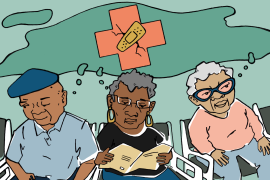While Medicare offers significant protections for older adults against high health care costs, it does not cover the full cost of care. Out-of-pocket costs, including deductibles and coinsurance for some services, are a burden for Medicare beneficiaries, including many Black and Latinx older adults who have low incomes, complex health needs, and difficulties paying medical bills. To better understand the impact of cost burden and health care affordability, PerryUndem, a public opinion research firm, held 12 focus between July and October 2021 with Black and Latinx Medicare beneficiaries age 65 and older to understand their thoughts on the affordability of health care, among other topics. (For details, see How We Conducted This Study.)
Surprised That Care Remains Unaffordable Under Medicare
Many of the Black and Latinx older adults in our focus groups told stories of being uninsured and struggling to afford care and how they thought enrolling in Medicare would put an end to these worries. They expressed frustration that they must still consider costs before seeking care.
As one participant put it, if care were more affordable, “maybe we’d go for more (doctor) visits. We’d go get the tests we need. I think after working to get your Medicare, at that point you should be able to get your care and it should be affordable.” While more care, particularly unnecessary care, isn’t always better, affordable care helps to ensure that people have access to the care they need.
Cost also plays a role in decisions to enroll in a Medicare Advantage plan or buy a supplemental plan. Some feel they made a good choice, others have regrets and are paying more than they expected.
You want to be able to get prescriptions, testing, doctor’s visits. It’s ridiculous what things cost. I needed a prescription that was $300 a month. It’s ridiculous! I feel like we should be a little more secure with our medical stuff.
Many participants explained that costs are not clear when they receive services. They are often caught unaware with large bills to pay. Some feel costs for services are random and vary between providers and facilities. Others believe they are charged higher prices because of their race, income, gender, or type of insurance.
High Costs a Barrier to Care
Participants also discussed how unexpected or high costs caused them to second-guess or delay care. This is consistent with previous research, which has found that roughly 10 percent of traditional Medicare beneficiaries postpone or avoid care because of costs.
And right now, I am on a medication . . . a blood thinner, because I have Afib. I want to get off of it [because of side effects] but I can’t because all the other medications are super pricey and I can’t afford it.





